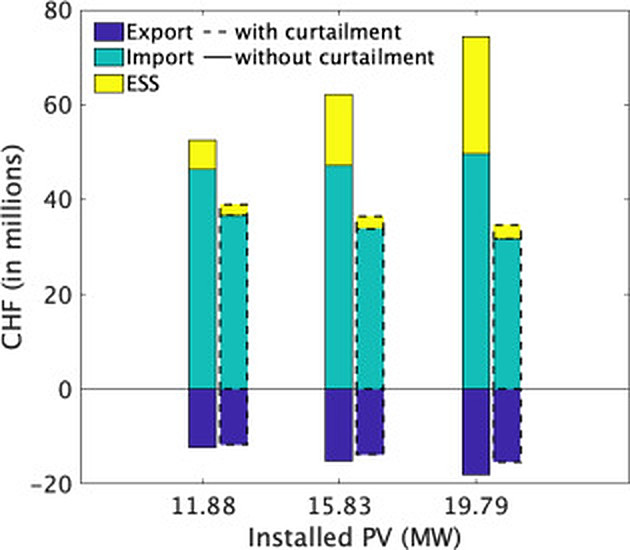Researchers in Switzerland have developed a new methodology for energy storage siting and sizing, in response to the curtailment of PV generation and grid constraints. They aim to determine whether curtailment could be cheaper than energy storage in medium-voltage distribution networks with distributed-generation PV capacity.
The used a linearized power flow model instead of traditional non-linear AC optimal power flow models.
“We use a linearized power flow model because it can be applied to distribution grids with both radial and meshed configurations, as opposed to second-order cone relaxations that are typically valid for radial systems,” they explained.
They considered storage costs, operational costs, grid constraints, electricity costs, PV generation models, and loads. They also assumed that energy storage provides active and reactive power compensation in the event of overproduction from PV.
They found that the viability of storage systems and their sizing are strictly dependent on electricity prices, which can be influenced by higher or lower levels of PV generation. The scientists concluded that curtailment is cheaper than installing batteries.
“A sensitivity analysis showed that decreasing costs of energy storage technologies could make installing energy storage cost-competitive compared to curtailing PV generation,” they said.
They presented their findings in “Optimal sizing and siting of energy storage systems considering curtailable photovoltaic generation in power distribution networks,” which was recently published in Applied Energy. The research group includes scientists from the École polytechnique fédérale de Lausanne (EPFL) and Switzerland's Institute of Sustainable Energy.
“Studying sizing and siting of energy storage systems, in combination with curtailment of PV generation for satisfying the grid constraints stands as the main contribution of this paper,” they concluded.
This content is protected by copyright and may not be reused. If you want to cooperate with us and would like to reuse some of our content, please contact: editors@pv-magazine.com.




1 comment
By submitting this form you agree to pv magazine using your data for the purposes of publishing your comment.
Your personal data will only be disclosed or otherwise transmitted to third parties for the purposes of spam filtering or if this is necessary for technical maintenance of the website. Any other transfer to third parties will not take place unless this is justified on the basis of applicable data protection regulations or if pv magazine is legally obliged to do so.
You may revoke this consent at any time with effect for the future, in which case your personal data will be deleted immediately. Otherwise, your data will be deleted if pv magazine has processed your request or the purpose of data storage is fulfilled.
Further information on data privacy can be found in our Data Protection Policy.